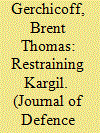| Srl | Item |
| 1 |
ID:
126116


|
|
|
|
|
| Publication |
2013.
|
| Summary/Abstract |
The United Nations (UN) peacekeeping 'Capstone doctrine' is the first attempt by the Department of Peacekeeping Operations/Department of Field Support (DPKO/DFS) to formulate a coherent doctrine for peacekeeping/peacebuilding missions beyond Boutros-Ghali's An Agenda for Peace and the Brahimi Report, which set out a very general approach as opposed to a doctrinal mandate. In the document, the UN lays down a framework for approaching peace operations, and also defines contemporary UN peacekeeping operations. While this document is designed, by and large, as a guide for UN personnel, it is appropriate to evaluate it to determine whether or not Capstone is consistent with theoretical literature. Furthermore, this article will assess how various components of the doctrine are derived from previous experiences. Lastly, this article will discuss how far the Capstone doctrine is consistent with the major paradigms of international relations theory, and will argue that the doctrine reflects the liberal and constructivist paradigms of international relations theory.
|
|
|
|
|
|
|
|
|
|
|
|
|
|
|
|
| 2 |
ID:
121078


|
|
|
|
|
| Publication |
2013.
|
| Summary/Abstract |
The debate surrounding the stability of nuclear weapons has been a critical issue for the last half century. On the one hand, realists like Kenneth Waltz argue that the proliferation of nuclear weapons will foster greater stability due to the intrinsic deterrent logic associated with these weapons. The nuclear pessimists, on the other hand, argue that the accidental use of nuclear weapons and unstable regime types are a greater concern for the outbreak of nuclear war. With no clear consensus in sight, this article argues that the nuclear deterrent logic is the most compelling explanation for the lack of full-scale war. It takes as its case study the 1999 Indo- Pakistani conflict at Dras-Kargil. This crucial case study demonstrates that the caution and, therefore, deterrent effects associated with nuclear weapons in the Indo-Pakistan rivalry confirms that caution and stability result from the introduction of these weapons on the Sub-continent.
|
|
|
|
|
|
|
|
|
|
|
|
|
|
|
|